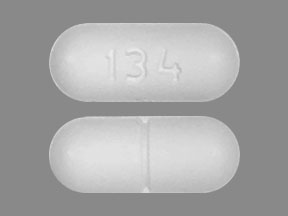Captopril Dosage
Medically reviewed by Drugs.com. Last updated on Jun 2, 2025.
Applies to the following strengths: 12.5 mg; 25 mg; 50 mg; 100 mg
Usual Adult Dose for:
- Hypertension
- Congestive Heart Failure
- Left Ventricular Dysfunction
- Diabetic Nephropathy
- Hypertensive Emergency
Additional dosage information:
Usual Adult Dose for Hypertension
Initial dose: 25 mg orally 2 to 3 times a day one hour before meals
Maintenance dose: May increase every 1 to 2 weeks up to 50 mg orally three times a day. If blood pressure remains uncontrolled after 1 to 2 weeks at this dose, add a thiazide diuretic (loop diuretic if severe renal impairment exists) and titrate to its highest usual antihypertensive dose before further increases of captopril.
Maximum dose: 450 mg/day
Usual Adult Dose for Congestive Heart Failure
Initial dose: 25 mg orally three times a day (6.25 to 12.5 mg orally three times a day if hypotensive, hyponatremic, or hypovolemic)
Target maintenance dose: 50 mg orally three times a day for at least two weeks to ensure a satisfactory response
Maximum dose: 450 mg/day
Comments:
- Most patients experience satisfactory clinical improvement at 50 or 100 mg orally three times a day.
- Should generally be used in conjunction with a diuretic and digitalis.
Usual Adult Dose for Left Ventricular Dysfunction
Initial dose: 6.25 mg orally once as early as three days post-myocardial infarction, followed by 12.5 mg orally three times a day; increase to 25 mg orally three times a day over the next several days, and then increase to target dose over the next several weeks as tolerated.
Target maintenance dose: 50 mg orally three times a day
Use: To improve survival following myocardial infarction in clinically stable patients with left ventricular dysfunction manifested as an ejection fraction of 40% or less and to reduce the incidence of overt heart failure and subsequent hospitalizations for congestive heart failure in these patients.
Usual Adult Dose for Diabetic Nephropathy
25 mg orally three times a day
Comments: Other antihypertensives may be used in conjunction with this drug if additional blood pressure reduction is required.
Use: Treatment of diabetic nephropathy (proteinuria greater than 500 mg/day) in patients with type I insulin-dependent diabetes mellitus and retinopathy.
Usual Adult Dose for Hypertensive Emergency
25 mg orally 2 to 3 times a day; continue diuretic therapy and stop other antihypertensives upon initiation of this drug; may increase dose every 24 hours or less until satisfactory blood pressure or maximum dose is reached.
Renal Dose Adjustments
Reduce initial dose and titrate using 1 to 2 week intervals. This drug should be used at the lowest effective dose.
Liver Dose Adjustments
Data not available
Precautions
US BOXED WARNING:
- FETAL TOXICITY: If pregnancy is detected, discontinue this drug as soon as possible. Drugs that act directly on the renin-angiotensin system (RAS) can cause injury and death to the developing fetus.
Safety and efficacy have not been established in patients younger than 18 years.
Consult WARNINGS section for additional precautions.
Dialysis
Data not available
Other Comments
Administration advice: Should be taken 1 hour before meals.
Monitoring:
- Monitor serum electrolytes periodically.
- In patients with impaired renal function, monitor white blood cell and differential counts prior to starting treatment and approximately every 2 weeks for the first 3 months, then periodically. Also monitor white blood cell counts in patients with collagen vascular disease, especially if associated with impaired renal function.
- Patients with prior renal disease or those receiving doses greater than 150 mg per day should have urinary protein estimations prior to treatment and periodically thereafter.
Patient advice:
- Advise patients to immediately report any signs or symptoms of angioedema (breathing difficulty or swelling of face, eyes, lips, or tongue) and to stop taking this drug until consulting a physician.
- Tell patients to promptly report any sign of infection (e.g., sore throat, fever), which may be a sign of neutropenia, or of progressive edema which might be related to proteinuria and nephrotic syndrome.
- Caution patients to consult their physician if excessive perspiration, dehydration, vomiting, or diarrhea occurs as it may lead to excessive blood pressure reduction due to reduced fluid volume.
- Advise patients against using potassium-sparing diuretics, potassium supplements or potassium-containing salt substitutes without consulting their physician.
- Warn patients against interruption or discontinuation of this medication unless instructed by their physician.
- Caution heart failure patients against rapid increases in physical activity.
- Females of childbearing age should be informed of the consequences of exposure to this drug during pregnancy; ask these patients to report pregnancies as soon as possible.
Frequently asked questions
More about captopril
- Check interactions
- Compare alternatives
- Pricing & coupons
- Reviews (7)
- Drug images
- Side effects
- During pregnancy
- Drug class: Angiotensin Converting Enzyme Inhibitors
- Breastfeeding
- En español
Patient resources
Other brands
Professional resources
Related treatment guides
See also:
Further information
Always consult your healthcare provider to ensure the information displayed on this page applies to your personal circumstances.


